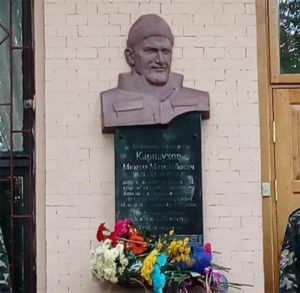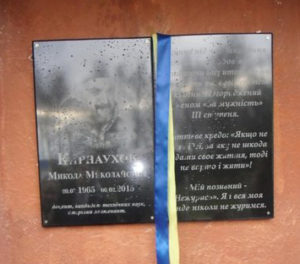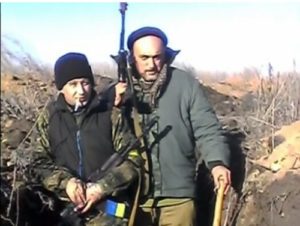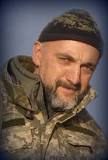 Mykola Karnaukhov was born on July 20, 1965, in the city of Kokchetav, Kazakh Soviet Socialist Republic. In 1982, he entered the Mechanical Department of the Ukrainian Institute of Water Management Engineers (specialization of Mechanization of Irrigation and Drainage Works). Having graduated from it in 1989, Mykola obtained the qualification of a mechanical engineer. After serving in the Air Force from 1983 to 1985, he started his career.
Mykola Karnaukhov was born on July 20, 1965, in the city of Kokchetav, Kazakh Soviet Socialist Republic. In 1982, he entered the Mechanical Department of the Ukrainian Institute of Water Management Engineers (specialization of Mechanization of Irrigation and Drainage Works). Having graduated from it in 1989, Mykola obtained the qualification of a mechanical engineer. After serving in the Air Force from 1983 to 1985, he started his career.
At first, he worked as an engineer of the research sector in the Ukrainian Institute of Water Management Engineers in 1989. Shortly after that, he became a junior research associate in the Faculty of Construction and Ameliorative Equipment there. From 1992 to 1994, Mykola did a postgraduate course. After finishing it, the fate connected his life with the Faculty of Vehicles, Vehicle Fleet, and Metal Technology. He made his way from assistant to associate professor in this faculty. Mykola Karnaukhov is an author of more than 50 scientific and academic papers, particularly 4 copyright certificates and invention patents.
He was an instructor in the National University of Water and Environmental Management, associate professor of the Faculty of Vehicles and Vehicle Fleet, Ph.D. in Technical Sciences.
A senior lieutenant Mykola Karnauhov served as a deminer in the 57th Brigade of the Armed Forces of Ukraine. His family received the last news from him on February 4. After that, Mykola went missing near Chernuhino, Debaltseve Raion, on February 5-6, 2015. He was seen wounded. Later, it became known that the soldier died on February 6. During a long period of time, Mykola’s body had been kept in one of the morgues in Dnipropetrovsk.
The hero was buried in the Alley of Heroes at the New Cemetery, Rivne, on March 10.
According to the Presidential Executive Order № 270/2015 on May 15, 2015, the soldier was posthumously awarded the Third Class Order For Bravery “for valor and high professionalism demonstrated in the protection of the state sovereignty and territorial integrity of Ukraine, loyalty to the oath of enlistment”.
On September 17, 2015, the City Council of Rivne issued a decree that conferred Mykola Karnauhov the title of Honorary Citizen of Rivne.
Karnaukhov Mykola Mykolaiovych
Memories of him by the wife Halyna Konarchuk
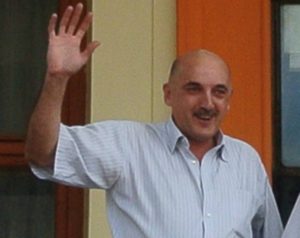 Mykola is one of the twins. He has a sister, Ira. Mykola was born in Kokchetau, Kazakhstan. His father is from there. He met Mykola’s mother when he had arrived in Rivne to harvest works.
Mykola is one of the twins. He has a sister, Ira. Mykola was born in Kokchetau, Kazakhstan. His father is from there. He met Mykola’s mother when he had arrived in Rivne to harvest works.
Their family has a tradition – the first son would be named Mykola. So, his father was Mykola Mykolaiovych Karnaukhov. And our son’s name is Mykola Mykolaiovych Konarchuk-Karnaukhov, too.
We’ve been together for 24 years. Our common son is 23 years old. I am Mykola’s second wife. He has a daughter, Oksana, from his first marriage.
I’m a librarian, and Mykola, my future husband, was a reader of our library. I didn’t pay any attention to him. I couldn’t even remember his name, though I filled out the service list several times. One day, when he came from Leningrad, he brought me a coffee in the library before the New Year. Later, my life was touched by a tragedy – my sister died of cancer. And I was either crying or I just was sad. Mykola noticed it. I was going for lunch when he came up to me and asked: «Excuse me, what’s wrong with you? ». That’s how we became friends.
When we met in September, he seemed agitated. He told me that there were family troubles (domestic difficulties), that he was going to get divorced. I was a little surprised because we weren’t close enough to share such things with each other. Afterwards, he came to the library with his daughter. She was 5 years old. He said that the judge granted him time for reflection before the divorce. After that, he picked me up from work and walked home several times. We went out for coffee. He made it clear that he was interested in me. When he was away on business, he wrote me a letter so I could read between the lines that he was impressed with our acquaintance.
I didn’t know he was 13 years younger than I was. I thought he was older than me because he was a little on the bald side. I’ve always looked younger than I really was.
When I found out how old he was, I told him that we shouldn’t date because he was much younger than me. And he said: «So what? I knew from the beginning how old you were ».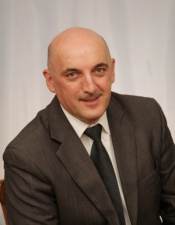
Mykola had a lot of respect for his family. He went to his village almost every Friday. It’s called Zarichne, Hoshchanskyi District. His mother and sister live there. He bought everything that was needed – tomatoes, a loaf, coffee, candies, cookies, tangerines and drove it to the village. Mykola’s mother met him and asked jokingly: «Coming home with «empty pockets? » ». Despite the fact he was an associate professor and a research officer, right after changing his clothes, Mykola started to garden or work in the barn. Now I also buy some presents when I visit my mother-in-love and say jokingly: «It’s from me and Mykola. We’re coming home with «empty pockets»»
We used to do everything together. We set the table just like in a restaurant. Mykola liked to cook, especially pilaf, meat pasties, dumplings, doughnuts. I’m good at baking patties (cakes) and he constantly asked me to make doughnuts. I refused. When I got home from work one day, I saw him cooking something. I asked him, «What are you doing? ». And he said, «I’m cooking doughnuts because I won’t see you making them».
Women changed their behaviour in his presence. Once I was sitting in the reading room and I heard some fuss, noise and women’s laughter. It was a sign that Mykola was already there. He was well-liked. Women fancied the pants off him (were thrilled with him) His personality was just like magnetic. He had a good sense of humour, so everyone laughed until cry.
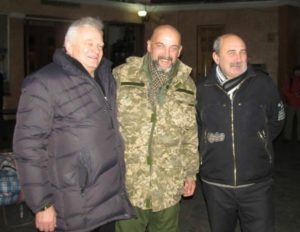 Mykola is half Russian (on his father’s side). He respected Russian culture and read the works of Brodsky. He raved about Altai, wanted to live there. So it sounds so cynical when Putin says that he is sort of protecting Russians in Ukraine.
Mykola is half Russian (on his father’s side). He respected Russian culture and read the works of Brodsky. He raved about Altai, wanted to live there. So it sounds so cynical when Putin says that he is sort of protecting Russians in Ukraine.
He enjoyed reading everything about wars, especially about planes and tanks. He was going to bookstores trying to find the book “Secrets of the Great Patriotic War”. Mykola was well-read, erudite. In brief, he was an intelligent man. He tried to find as much information on the Internet as possible about things he was curious about.
I didn’t expect him to be called up for military service. He had the contraindications for being called to arms. He had a craniocerebral injury because one day hooligans struck him over the head on his way back home. Mykola had the headaches after that but who cares?
After he received a call-up order (induction notice) I couldn’t sleep at night. I had been only sleeping like 3-4 hours a night. I was watching news or playing solitaire to take my mind off it. We called each other every morning and night. We could still call each other in the first months, when he was in Kirovohrad.
I remember I was at my computer when he called:
- Where are you?
- I’m home.
- Open up! I’m downstairs.
It turned out that he was back for something in Dubno and stopped by.
He was eager to return east from his vacation. He became jumpy and didn’t sleep at all. I asked him to go into the hospital for a few weeks to get some medical treatment. “See, I can’t do this. I promised I’ll get back by 30 December”, he said. Mykola wrote poems, sent them in text messages to me, to his mother and friends. When they had to go to Debaltsevo, he texted me “We’re going to Debaltsevo. Remember me kindly.”
He was killed by tank round. He called me a short time before and said “We are not ordered to drop behind; tanks are in front of us. I think it’s some kind of yard and the five of us are here.” That place was Chornukhino and they, deminers, were sitting there. It’s only 10 kilometres from Debaltsevo and they were sent there for some reason. The tank fired at peasant house. One soldier (warrior) was decapitated and Mykola had his arm and legs blown off. Now I’m reading the book he read before he left for east and there are pictures of the Soviet tanks. I realized he was destined to die this way.
“I feel I’m gonna get killed”, he said to me when he left home for the last time.
“Make sure I’m buried in the country.” But he is buried in Walk of Fame in Rivne along with Ihor Voloshyn and Oleksandr Borysenko , young men he died with.
“My codename is Don’t be sad“ and we’re not sad too. We’ll tear them into pieces”, Mykola was talking in the video, posted on the Internet by militias. Right after that was the video of them being killed. I didn’t recognize him among the killed. I thought it wasn’t him. We all thought he was captured and tried to find him with the help of the police, but soon his nephew recognized Mykola among the killed. We were able to bury him just only one month after his death because militias didn’t release the body.
In the first months following the funeral, my heart sank when I saw a figure in camouflage that looked like Mykola or the bald-headed man with a moustache.
I remember him on my way to work. We didn’t even have time to talk well because our work schedules didn’t coincide. I was always working on the weekends but he wasn’t.
It seemed like there would be time to talk well, to be together.
